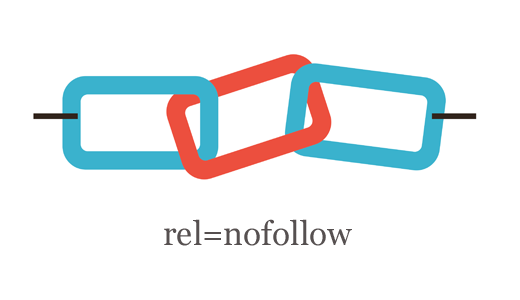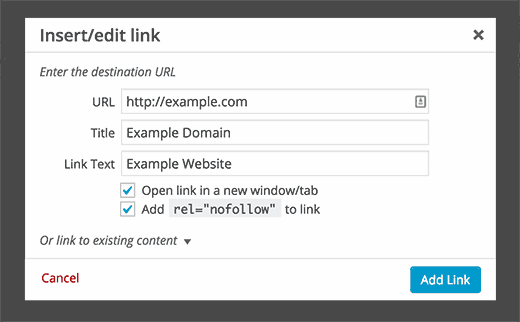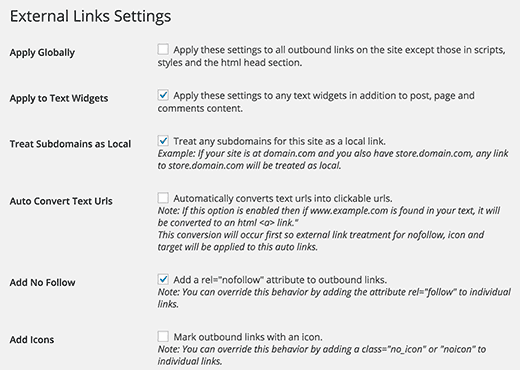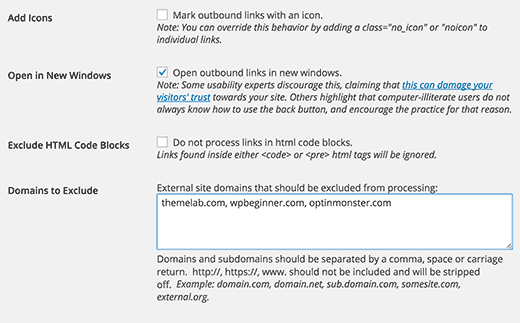Souhaitez-vous mettre les liens externes en nofollow sur votre site WordPress ? Bien que vous puissiez facilement ajouter l’identifiant nofollow à des liens individuels, que se passerait-il si vous vouliez mettre tous les liens externes en nofollow ? Dans cet article, nous allons vous afficher comment mettre tous les liens externes en nofollow sur WordPress.
Pourquoi et quand vous avez besoin de mettre tous les liens externes en nofollow ?

Les moteurs de recherche considèrent les liens comme un signal de classement pour l’URL et le domaine liés. Lorsque vous créez un lien vers un site externe, vous transmettez votre jus de lien à ce site.
Le jus de liens est en quelque sorte votre carte de score en matière de référencement. Si vous créez des liens vers plus de sites que les sites qui vous renvoient des liens, vous commencerez à perdre de l’autorité.
C’est pourquoi de nombreux experts en référencement recommandent d’utiliser l’attribut nofollow.
Exemple de lien avec attribut nofollow :
<a href="http://example.com" rel="nofollow">Exemple de site web</a>
Par défaut, WordPress ne vous permet pas d’ajouter automatiquement l’attribut nofollow aux liens externes. Vous devrez l’ajouter manuellement aux liens sortants vers des sites externes.
Un moyen plus simple est d’utiliser l’extension Title and NoFollow For Links. Il ajoute un champ de titre et une case à cocher nofollow dans la fenêtre surgissante d’insertion du lien. Vous pouvez rendre les liens nofollow au fur et à mesure que vous les ajoutez.

Mais si vous gérez un site avec plusieurs auteurs/autrices, il y a de fortes chances que vos auteurs/autrices oublient de cocher la case pour certains liens externes. Dans ce cas, vous avez besoin d’une solution qui ne nécessite aucune saisie de la part de l’utilisateur.
Ceci étant dit, voyons comment vous pouvez ajouter nofollow à tous les liens externes dans WordPress sans qu’aucune saisie ne soit nécessaire de la part de l’utilisateur.
Ajouté NoFollow à tous les liens externes dans WordPress
La première chose à faire est d’installer et d’activer l’extension External Links. Une fois activé, vous devez visiter la page Réglages ” Liens externes pour configurer les paramètres de l’extension.

La première option dans les réglages de l’extension applique le nofollow globalement. Vous pouvez la laisser décochée si vous avez uniquement accès aux fichiers de votre thème.
Défilez un peu vers le bas et activez “Add Nofollow” en cliquant sur la case à cocher à côté. Cette option ajoutera le nofollow à tous les liens externes dans les publications et les pages de WordPress.
Il existe un certain nombre d’options sur la page des Réglages que vous pouvez activer.
Vous pouvez ajouter le nofollow aux liens dans les widgets de texte de WordPress. Vous pouvez également permettre à l’extension de traiter les sous-domaines comme des sites locaux et de les exclure des règles nofollow.
L’extension External Links vous permet également d’ouvrir un lien externe dans une nouvelle fenêtre et vous pouvez même afficher une icône à côté des liens externes.

Si vous avez d’autres sites que vous souhaitez exclure des règles nofollow, vous pouvez les ajouter dans la section “Domaines à exclure”.
N’ajoutez pas http ou www et utilisez des virgules pour séparer les domaines. Cliquez sur le bouton Enregistrer les modifications pour stocker vos Réglages.
Note : Veuillez noter que l’extension ajoute ces attributs à la volée. En désactivant l’extension, le nofollow sera supprimé de tous les liens.
C’est tout, nous espérons que cet article vous a aidé à NoFollow tous les liens externes dans WordPress. Vous pouvez également consulter notre guide sur la façon de masquer les liens d’affiliation sur votre site WordPress.
Si vous avez aimé cet article, veuillez vous abonner à notre chaîne YouTube pour obtenir des tutoriels vidéo sur WordPress. Vous pouvez également nous trouver sur Twitter et Facebook.





Jiří Vaněk
What concerns ‘nofollow,’ is it good to always use it, or make an exception for pages with very high authorit
WPBeginner Support
You could skip nofollow for high value sites for your articles but it is a question of testing and personal preference for which sites you don’t include nofollow for.
Admin
Christen Costa
Note: This plugin broke a number of our category pages as of June 2019. I’d be very careful. And by break, I mean the category pages were appearing blank.
WPBeginner Support
Thank you for letting us know, we’ll certainly take a look at the plugin and update the article once we find an alternative should it not be working.
Admin
Paul
Hi there,
Thanks for the help. I installed the External Links plugin. Quick question though. A lot of the links on my website are in the form of buttons, would the External Links plugin you suggested also work on these and make them nofollow? I assume it would as from my understanding it makes all outbound links no follow correct?
Thanks
Paul
Natasha
I thought you only had to make links no follow that would be earning a profit? Like affiliate links?
So, your saying ALL external links need to be no follow?
WPBeginner Support
Yes, unless those external links are to websites that you own and want them to benefit from a dofollow link.
Admin
Sagar Patil
Thank you very much, i used External links plugin.
Amit Singh
Hello,
Good Article. I have an issue regarding my wp site. inbound Link on posts or pages (only for posts / page. In sidebars, footer it works fine.) not working on small devices like mobile but working fine in computer. How to fix this issue. I am using WP External Link plugin but no result. I also used open external link wp plugin as i read in your site but not worked. Please help me to fix this issue.
Thanks
Dheeraj Tiwari
Thank you very much. It really helps me out!
Sandeep
I recently loss my ranking in google. I have a job alert website, i do everything correct but i use all externel links without no follow and next window..my website has approx 1000 externel links. Any idea to get back ranking in google? Please reply wpbeginner you are only hope for me…
WPBeginner Support
Hey Sandeep,
Please follow the instructions described in the article. With the help of ‘External Links’ plugin you will be able to add nofollow to all external links.
Admin
sean
I am using a plugin to no follow all external links. But sometimes I need to make a link do follow and for that I use rel= “do follow”. When I check, It showed both no follow and do follow.
What Should I do?
WPBeginner Support
You should see the documentation of the plugin you are using to nofollow all links. Plugin author may have described how to make some links do follow. If they haven’t, then you should ask them how to do that.
Admin
Usman
Thanks for help us by providing step to step guide.
Sheryl
I recently received a disturbing e-mail from Google saying:
Google has detected a pattern of links from your site to other sites that is either unnatural or irrelevant. This pattern attempts to artificially boost other sites’ ranking in Google Search results. Such unnatural ranking would cause search results to show preference for results not relevant to the user’s actual query. It also violates Google Webmaster Guidelines. Therefore, we are discounting the trust in links on your site.
I use Affiliate links in almost every post and I now have over 450 posts — If I have to manually code each link it will take forever to do…. Can I somehow get an explanation from Google on exactly what caused this action?
Thanks
Sheryl
Rodrigo
Any further feedback on the pros & cons of non-folliwing al-links? I haven’t made my mind yet. I just installed this plugin, but now, reading the comments, I wonder whether it was the right thing to do.
WPBeginner Support
Not all links. You should only apply no follow to external links. External links are those that take users away from your website to another website.
Admin
Rodrigo
Thank you!
Arize
Well, Thanks you should have said that earlier
Ted
I wish you had given us a real solution to do this. Adding, yet again, another plugin to fix the problem is not the right way to go.
Peter griffiths
I think it’s important to note that in almost all circumstances it’s not a good idea to no follow ALL external links as that completely defeats the purpose – it’s clear that Google thinks this too
A while ago I thought about using a plugin to do this but a website looks much more natural if you don’t do this. If you think about it it says to Google that all external links on the site are paid links, and if all links can be bought, how useful would they be for the visitor and a different site that doesn’t nofollow everything should be ranked higher as a result – correct me if I’m wrong though.
Gaurav Khurana
Good to know such kind of plugins exists which can help in such a nice way
Mickey
The idea of using nofollow to preserve link juice died in 2009. At this point, it costs you the link juice whether you nofollow it or not. Here’s some details from WooRank:
If you trust the link, let it be followed. Give them their credit back, because it’s the same to you either way. If you don’t trust the link, why do you have it on your blog at all?
Nofollow ads, of course, or anything user-generated (comments, etc), but anything else in your blog should be left open and followed.
Gaurang Thakor
Totally agree with you, sir!
Mark Corder
In SEO / NoFollow discussions, I’ve heard that having links to external sites that supplement your content is good, and that they should be allowed to “follow”. My photoblog has many external links, and most lead to official information associated with the photo I’m presenting – like State Park / Forest Service websites and Wikipedia articles.
Should I be marking these as NoFollow?
muncy
Opening links in a new window is not a good accessible practice.
Diamsy
Why do you say that it is not a good accessible practice?